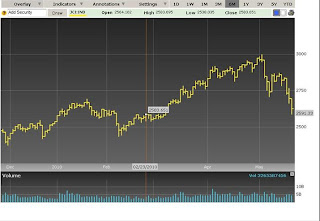 Nickel Restocking and supply disruptions have tightened the market considerably?
Nickel Restocking and supply disruptions have tightened the market considerably? Nickel traded on the LME advanced 15 percent this year, the best performer among the six main metals traded on the bourse. Nickel prices also jumped this year after demand surged. World stainless steel output rose 55 percent to 7.47 million metric tons in the first quarter, according to the International Stainless Steel Forum. Nickel increases the resistance of stainless steel to corrosion.
Nickel prices have remained relatively strong despite the jitters in broader markets in early May, as demand returns from the stainless steel sector and supply disruptions continue. LME 3-month nickel came within a whisker of a two-year high in mid-April at $27,590/t, up 49% from the start of the year.
Nickel prices have dropped 22 percent from this year’s high of $27,595 a ton on April 16 on speculation European efforts to curb government debt will erode economic growth and China may step up measures to reduce asset bubbles.
Nickel Consumption may be 1.51 million tons next year, Consumption this year may be 1.435 million tons, outpacing supply of 1.4 million tons, Stainless steel production may be 31.5 million tons in 2011, growing from 29 million tons this year, John Barkas, director of Metalytics Ltd. said at a conference in Shanghai (26 May 2010). Demand for the metal, used to help protect steel from corrosion, will probably exceed supply by 36,000 tons in 2010, the first deficit since 2006, Sumitomo Metal Mining Co.
Furthermore, the ten-month strike at Vale’s Sudbury nickel operations in Canada is no nearer to resolution and production rates there remain vastly reduced. This in part explains why US premiums have risen so rapidly in recent months. Scrap supply is also tight.
Nickel prices have dropped 22 percent from this year’s high of $27,595 a ton on April 16 on speculation European efforts to curb government debt will erode economic growth and China may step up measures to reduce asset bubbles.
Nickel Consumption may be 1.51 million tons next year, Consumption this year may be 1.435 million tons, outpacing supply of 1.4 million tons, Stainless steel production may be 31.5 million tons in 2011, growing from 29 million tons this year, John Barkas, director of Metalytics Ltd. said at a conference in Shanghai (26 May 2010). Demand for the metal, used to help protect steel from corrosion, will probably exceed supply by 36,000 tons in 2010, the first deficit since 2006, Sumitomo Metal Mining Co.
Furthermore, the ten-month strike at Vale’s Sudbury nickel operations in Canada is no nearer to resolution and production rates there remain vastly reduced. This in part explains why US premiums have risen so rapidly in recent months. Scrap supply is also tight.
Short term outlook of Nickel
Restocking and supply disruptions have tightened the market considerably and LME stocks are now in decline. The continued supply disruptions have prompted us to estimated nickel market balance down to deficit.
Crude Palm Oil
 On the back of increasing concerns on the China bubble and the EU’s debt crisis made CPO demand lower and depress commodity prices. Europe accounted for 26% of Indonesia’s total CPO exports the second highest after India. This will adversely impact sentiment on Indonesian CPO counters and with possible lower average CPO price. Indonesia’s CPO exports in March reached 1.06m tons, down 9% m-m and 10% y-y, mainly due to lower exports to India, the EU and China.
On the back of increasing concerns on the China bubble and the EU’s debt crisis made CPO demand lower and depress commodity prices. Europe accounted for 26% of Indonesia’s total CPO exports the second highest after India. This will adversely impact sentiment on Indonesian CPO counters and with possible lower average CPO price. Indonesia’s CPO exports in March reached 1.06m tons, down 9% m-m and 10% y-y, mainly due to lower exports to India, the EU and China.Should Palm Oil Average at $850 at 2H2010?
 I believe the current tightness in crude palm oil supply will keep prices firm crude palm oil and other oilseed price strength would extend into second half 2010.
I believe the current tightness in crude palm oil supply will keep prices firm crude palm oil and other oilseed price strength would extend into second half 2010. Palm oil may surge as in the second half as drier-than-usual weather curbs output in Malaysia and yields in Indonesia. Higher prices may also contribute to increased food inflation in China and India, the biggest users. Below-normal rainfall in Malaysia usually will start to be felt in May-August. El Nino, characterized by a warming of sea-surface temperatures across the equatorial Pacific, can cut rainfall in Asia, damaging crops including palm oil, rice, corn and sugar.
Export data released Tuesday showed a healthy increase, above market expectations. Palm oil exports for the May 1-25 period rose to around 1.03 million-1.05 million tons due to higher purchases from the Indian subcontinent and the U.S., data from cargo surveyors Intertek Agri Services and SGS (Malaysia) Bhd. showed.
Many had simply ignored the exports' increase as external cues were more pressing. But now that the dust has settled, and prices have either stabilized or in the case of crude oil, risen, market participants are less jittery and able to concentrate on local cues again.
I would be bullish on palm oil spot price for 2H10 and highly recommend accumulating cpo related stock. A recent decline in shares of palm oil producers is an “excellent buying opportunity” given the outlook for prices of the commodity.
 Bang Juntri
Bang JuntriDISCLAIMER: This report is issued by Bang Juntri. Although the contents of this document may represent the personal opinion of Bang Juntri. We cannot guarantee its accuracy and completeness.






